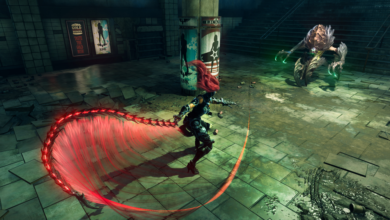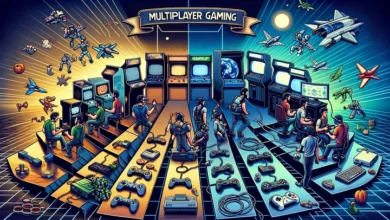The Role of AI in Online Gaming: How It’s Enhancing the Experience

The Role of AI in Online Gaming: How It’s Enhancing the Experience
Artificial Intelligence (AI) has become a transformative force across various industries, and online gaming is no exception. From creating more dynamic and engaging gameplay to improving personalized experiences, AI is enhancing the way we interact with games, develop strategies, and even compete in real-time. In 2025, AI has evolved significantly in online gaming, offering innovations that are redefining player experiences across multiple platforms.
This article delves into the role of AI in online gaming and how it is reshaping the gaming landscape, making games more immersive, intelligent, and adaptive than ever before.
1. AI-Powered NPCs: Creating Smarter Opponents
One of the most common applications of AI in online gaming is in the development of Non-Player Characters (NPCs). In traditional gaming, NPCs were often limited to predefined behaviors and simple reactions. However, AI has advanced to the point where NPCs can now exhibit complex behaviors that mimic human decision-making.
AI-controlled enemies can learn from the player’s tactics, adapt to changing playstyles, and provide more realistic challenges. Games like The Last of Us Part II and Halo Infinite have demonstrated how AI can create smarter, more reactive enemies that make decisions in real-time based on player actions.
Why It Matters:
- AI allows NPCs to react to player actions in a more natural and unpredictable way.
- Adaptive AI can keep gameplay challenging, forcing players to adjust their strategies continuously.
- AI-driven NPCs add realism and immersion, making the game world feel more alive and dynamic.
2. AI in Procedural Content Generation
Procedural generation is a technique that allows developers to create large, expansive worlds and environments without the need for manual design. AI plays a crucial role in procedural content generation, particularly in open-world games like No Man’s Sky and Minecraft. By utilizing AI algorithms, these games can generate unique landscapes, structures, and even quests, ensuring that every player’s experience is different.
AI can also help with generating missions or storylines, making sure that players are presented with content that is relevant to their playstyle, progress, and preferences.
Why It Matters:
- Endless replayability is possible as the AI generates procedurally unique game worlds and quests.
- AI helps ensure personalized content that is tailored to the player’s interests.
- Procedural generation powered by AI leads to vast, expansive game worlds without requiring massive amounts of human labor.
3. AI in Personalized Gaming Experiences
In the era of personalized experiences, AI helps developers adapt games to suit individual player preferences. By analyzing player data and behavior, AI can suggest missions, characters, or strategies that align with a player’s interests and skills. This personalization can lead to deeper engagement and satisfaction with the game.
For example, recommendation systems powered by AI analyze a player’s past actions, in-game decisions, and achievements to suggest new content, whether it’s in-game items, skins, or even multiplayer matches with players who share similar gameplay styles.
Why It Matters:
- AI enables personalized game suggestions based on player history and preferences, enhancing enjoyment.
- Personalized recommendations help to keep players engaged, guiding them to new content without overwhelming them.
- AI-driven experiences can make the game feel more tailored to each player’s unique playstyle.
4. AI in Dynamic Storytelling and Narrative
AI is also changing the way stories are told in online games. Traditional games often feature predetermined narratives where players follow a set storyline. With AI, developers can create more dynamic, branching narratives that respond to player choices in real-time.
Games like Detroit: Become Human and The Witcher 3: Wild Hunt have demonstrated how AI can dynamically adjust the plot based on player decisions, creating unique story paths. In multiplayer games, AI-driven story events can evolve depending on how players interact with the environment or complete missions.
Why It Matters:
- Dynamic storytelling powered by AI allows the plot to evolve based on player choices, making every playthrough unique.
- AI helps create immersive and responsive worlds where the environment and NPCs change in reaction to the player’s actions.
- AI-driven narratives can enhance player agency, making them feel like they’re shaping the world around them.
5. AI in Player Behavior Analysis and Matchmaking
AI is playing a vital role in improving matchmaking systems in online multiplayer games. Traditional matchmaking systems often rely on simple metrics like rank or level, but AI takes this a step further by analyzing a player’s skill level, playstyle, and behavioral tendencies. This allows for much more accurate matchmaking, resulting in fairer, more balanced games.
For example, AI can determine whether a player tends to play aggressively or defensively and match them with others who have a similar playstyle. This can also help reduce the impact of toxic behavior in games, as AI can identify and match players with more compatible temperaments.
Why It Matters:
- Better matchmaking ensures players are paired with teammates and opponents who share similar skills and playstyles, improving overall game enjoyment.
- AI helps reduce the impact of toxic players by recognizing patterns and making informed decisions about matchmaking.
- With AI-driven matchmaking, players are more likely to experience fair and challenging gameplay that matches their skill level.
6. AI and Real-Time Strategy Games
Real-time strategy (RTS) games are another genre where AI has had a significant impact. Games like StarCraft II, Age of Empires IV, and Command & Conquer: Remastered rely heavily on AI to simulate both strategic decision-making and resource management. AI can act as both the player’s opponent and a tool for improving the experience.
Advanced AI algorithms can control enemy factions, make tactical decisions, and learn from player strategies. In addition, some games use AI to coach players, offering suggestions for better strategies or highlighting potential weaknesses in gameplay.
Why It Matters:
- AI provides challenging opponents in RTS games, ensuring that players never face predictable enemies.
- AI-driven game coaching can help new players improve their strategies, making the genre more accessible.
- AI enhances complex gameplay by simulating intelligent decision-making in resource management and battle tactics.
7. AI in Anti-Cheat Systems
AI is also playing a key role in combating cheating and ensuring fair play in online gaming. By using machine learning and data analytics, AI can detect patterns of suspicious behavior that indicate cheating, such as aimbots or wallhacks. AI systems can analyze player data in real-time to identify abnormalities, providing developers with the tools to stop cheating before it negatively impacts the experience.
For instance, AI can learn to recognize suspicious patterns like impossibly accurate shots or unusual movement, flagging players for review or immediate action. This has been especially important in competitive online games like Fortnite, Apex Legends, and Valorant.
Why It Matters:
- Real-time detection of cheating and unfair practices ensures a level playing field for all players.
- AI’s ability to analyze large datasets helps identify cheating patterns that human moderators might miss.
- Anti-cheat AI systems help maintain integrity and fairness in competitive multiplayer games.
8. AI in Game Testing and Quality Assurance
Game developers are also leveraging AI to improve the game development process itself. AI is increasingly used in game testing and quality assurance (QA), where it can simulate player behavior, identify bugs, and even suggest improvements. This technology helps developers pinpoint issues that may arise during gameplay, from minor glitches to major game-breaking bugs.
AI-driven testing tools can rapidly play through large portions of the game, running through various scenarios to identify potential weaknesses in the game design. This significantly speeds up the QA process and ensures a smoother launch for new titles.
Why It Matters:
- AI-powered game testing enhances the development process by identifying issues more efficiently.
- Developers can leverage AI to improve game performance and optimization by running simulations on various hardware configurations.
- AI ensures that games are bug-free and offer a polished experience upon release.
Conclusion
AI has become an essential tool in the world of online gaming, making games more intelligent, immersive, and personalized. From enhancing NPC behavior and procedural content generation to improving matchmaking and anti-cheat systems, AI is reshaping the way we play games in 2025. As technology continues to advance, we can expect AI to continue enhancing our gaming experiences, offering smarter opponents, more dynamic storytelling, and fairer competitive environments.
The future of online gaming is undoubtedly intertwined with artificial intelligence, and its role will only become more pronounced as the gaming industry continues to evolve. Whether you’re a casual gamer or a competitive player, AI is making your gaming experience smarter, more challenging, and more enjoyable than ever before.




